See our first Beauty and the Beast Devotional if you missed it! This is part of our Beauty and the Beast Adventure which is focusing on the traditional fairy tale and examining it in light of Scripture and comparing it with relevant literature. We are not affiliated with or endorsing the new Disney movie.
The Beast: There, but for the grace of God, go I
We are the beast.
This is not a hard conclusion for Christians who believe that all have sinned and fall short of the glory of God (Romans 3:23). We have no trouble theoretically identifying ourselves with the shaggy beast in the traditional Beauty and the Beast fairy tale, knowing that Christ has sacrificially loved us and redeemed us. Praise the Lord!
But we often forget that
God shows his love us in that while we were still sinners, Christ died for us. (Romans 5:8, emphasis mine)
That means that we not only ARE beasts, without Christ we LOOK like beasts, ACT like beasts, THINK like beasts. And, Ephesians 2 reminds us that we were dead in our “beastliness,” without hope except in the grace of the Lord. Christ didn’t die for beautiful people; he died for ugly people, for beasts. He died for the Dorian Grays*, the boys on the island in Lord of the Flies, the Macbeths, the common thieves and murderers. And without Christ, we are those people.
*interestingly, Dorian Gray’s story also involves a mirror
The Beast: Humility v. Humiliation
It’s easy to unconsciously frame a hierarchy of sins in our mind: I don’t steal. I don’t do drugs. I’m not sexually promiscuous. I obey the civic laws. I’m not one of “those” people. And yet, we’re all “those” people. If we’re not outwardly, egregiously sinful, we’re no doubt guilty of less visible sins about which the Lord speaks strongly: pride, lust, greed, grumbling, anxiety, ….
Those who are aware of their sin and their true position before the Lord are characterized by humility, even if their outward circumstances are humiliating. Phiona, in The Queen of Katwe, is a lovely example of this as she tries to do what is right even amidst the squalor of the slum of Katwe. The tax collector who beats his breast and cries out, “Have mercy on me, O Lord, a sinner!” is another. But those who are not humble before the Lord often have to be humbled before the Lord: humiliation.
 Nebuchadnezzar’s Humiliation
Nebuchadnezzar’s Humiliation
In Daniel 4:30, Nebuchadnezzar claims that he has built his magnificent kingdom by and for himself. The Lord immediately rebukes him, and Nebuchadnezzar ends up in the fields acting like a beast. At the end of his life, he is restored as he praises the Lord. This is humiliation leading to humility. The Beast in Beauty and the Beast was once prideful; as a beast, he learns kindness in his humiliation.
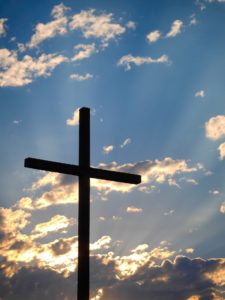
Christ’s Humility
Isaiah 53 tells us that Christ would be despised and rejected, that he had no form or majesty in his physical presence. Philippians 2 tells us that Christ humbled himself to take on our human form; he humbled himself in obedience unto death on the cross. This is humility leading to a chosen humiliation in obedience to God. In a sense, Beauty demonstrates this when she willingly submits to living with a beast instead of seeking a better suitor and living a life with her beloved father.
 Far As the Curse is Found
Far As the Curse is Found
It would be one thing if sin only lurked in our hearts, twisting them and distorting even our best actions and thoughts. But sin has distorted and twisted all of the Lord’s magnificent creation. It groans in anticipation of the second coming of Christ even as we long for heaven ourselves. Famine, droughts, the plain hard work of putting food on the table–evidences of the Fall. People are often plunged into poverty through no individual “fault” of their own. Or perhaps they are born with physical or mental challenges that make a “normal” life seem far out of reach. Why does the Lord allow some to be born into squalor? Others to be born fighting for life itself? Still others to get sick, experience a horrific accident, witness family members grow sick and die, …? Everywhere we look, we see evidences of our broken, twisted world.
Remember that when we see those broken, misshapen, ugly, and forlorn around us–that is the condition of our very hearts without Christ. And many who might appear “beastly” on the outside are actually far less beastly than the “beauties” are on the inside. We do well to look with compassion and love on those around us, regardless of their outward appearances. After all, Christ did the same for us!
 The Beast Redeemed
The Beast Redeemed
We will be looking at the redemption of the beast in later devotionals; suffice it for now to say that there will be a redemption and restoration of the fallen and lost! Revelation speaks of a new heaven and a new earth, of the downfall of THE beast (Satan), and Christ’s triumphant return. Come quickly, Lord Jesus, Come!
 Biblical Discussion Questions
Biblical Discussion Questions
- Read Daniel 4 and discuss the particulars of Nebuchadnezzar’s story. This is the same king who had Shadrach, Meshach, and Abednego thrown into the fiery furnace–that’s another great story to explore “inner and outer beastliness.”
- Read (and memorize!) Ephesians 2, Philippians 2, Isaiah 53, or select passages in Romans that remind us of our own beastly condition and Christ’s redeeming love on our behalf
- Proverbs is full of warnings against pride and the other “heart” sins we can easily hide beneath a beautiful exterior. Do some research with key words like pride or gluttony or foolishness and discuss some of those with your children or students. What are some ways we are guilty of these very sins? [The Sermon on the Mount in Matthew 5-7 is a terrific companion study!]
- Read Genesis 3 about the original Fall. Think about some of the many effects of those first sinful actions, the promise already given to Adam and Eve of Christ’s coming, and the ways in which we see that same tension around us (the fallen world, Christ’s redemptive work).
- Read Revelation 13, 19, and 21 and look at how the Bible speaks of a beast and Christ’s final return (including the new heavens and the new earth!)
- Compare and contrast such biblical characters as Saul (outwardly awesome) and David (a “nobody”) or look at Jesus’s genealogy (foreigners like Ruth, prostitutes like Rahab, etc).
- Traditional hymns often convey a rich sense of God’s grace and our sinfulness. Sing “Amazing Grace” or “Let Us Love and Sing and Wonder” this week (both by John Newton, the redeemed slave trader). Or “And Can It Be” or “Rock of Ages” or “When I Survey the Wondrous Cross” or….
Literary Discussion Questions
Literature is full of the beast motif. No need to answer all of these–pick and choose based on the books you and your children/students have read (or the movies you have watched)!
- In The Picture of Dorian Gray, Macbeth, The Death of a Salesman and Lord of the Flies, readers see clear pictures of “beasts” who are unredeemed. Are there other examples in literature you can think of where a main character is revealed to be beastly in some way and yet remains unrestored and unredeemed at the end?
 The Voyage of the Dawn Treader has a magnificent scene in which Eustace, in his dragon form, is being restored–painfully–at the hands of Aslan. How does this mirror the work of the Lord as he works on our own sinful, beastly selves?
The Voyage of the Dawn Treader has a magnificent scene in which Eustace, in his dragon form, is being restored–painfully–at the hands of Aslan. How does this mirror the work of the Lord as he works on our own sinful, beastly selves?- The Wingfeather Saga has one of the clearest and most marvelous portrayals of the beast and its transformation. This is a thread that runs throughout the books. How do the cloven illustrate our own fall into sin? (Think about the “behind-the-scenes” agency of Gnag.) How does the final, true restoration of the fangs and the cloven illustrate our own redemption? Who paid that cost for us? [this is a particularly rich thread to explore!]
- Wonder and Ugly (and Penelope, the movie) are about children born with physical deformities–ones readily apparent to those who see them. How do these characters deal with those realities? How do those around them deal with these realities? How do these characters demonstrate inner beauty even as their outward appearance might seem “beastly”? Do you know anyone struggling with similar physical struggles? (Or, perhaps you are yourself!) What are ways those of us who aren’t struggling with these issues can come alongside and love those who are? How are ways we can all be beautiful on the inside regardless of our outward appearance? (for younger children, good companion stories are The Velveteen Rabbit and The Ugly Duckling) See also our discussion of Wonder and Ugly
 Every Falling Star and The Queen of Katwe both show children in poverty, desperate for food. Sungju turns into a beast: stealing, killing, and even resorting to helping prostitutes find their income; he is rescued out by his father. Phiona is an angry, dirty child of the slums and likely to follow in her sister’s footsteps, sleeping with a man in return for food, until she is rescued by the intervention of her chess coach. How do these two stories mirror our own condition here on earth? What are some specific connections you can see in your own life where the Lord (through the intervention of people in your life) has rescued you out of perilous situations and helped turn humiliation into humility and grace? How can you be one of those “grace” agents in the lives of people around you?
Every Falling Star and The Queen of Katwe both show children in poverty, desperate for food. Sungju turns into a beast: stealing, killing, and even resorting to helping prostitutes find their income; he is rescued out by his father. Phiona is an angry, dirty child of the slums and likely to follow in her sister’s footsteps, sleeping with a man in return for food, until she is rescued by the intervention of her chess coach. How do these two stories mirror our own condition here on earth? What are some specific connections you can see in your own life where the Lord (through the intervention of people in your life) has rescued you out of perilous situations and helped turn humiliation into humility and grace? How can you be one of those “grace” agents in the lives of people around you?- This theme is everywhere! Watch for teachable moments. How does a movie like Jurassic Park show both the fallen nature of humanity AND the fallenness of Creation? What about someone like Long John Silver in Treasure Island? What others can you add?
Be sure to check out the other posts in our Beauty and the Beast Adventure!
Images from Wikipedia, Amazon, and pixabay
Support our writers and help keep Redeemed Reader ad-free by joining the Redeemed Reader Fellowship.
Stay Up to Date!
Get the information you need to make wise choices about books for your children and teens.
Our weekly newsletter includes our latest reviews, related links from around the web, a featured book list, book trivia, and more. We never sell your information. You may unsubscribe at any time.
We'd love to hear from you!
Our comments are now limited to our members (both Silver and Golden Key). Members, you just need to log in with your normal log-in credentials!
Not a member yet? You can join the Silver Key ($2.99/month) for a free 2-week trial. Cancel at any time. Find out more about membership here.

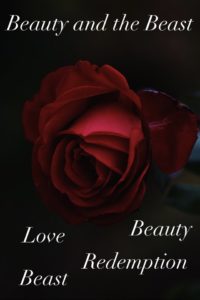
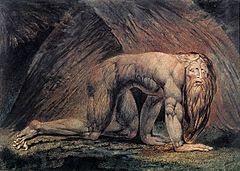 Nebuchadnezzar’s Humiliation
Nebuchadnezzar’s Humiliation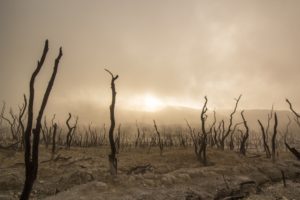 Far As the Curse is Found
Far As the Curse is Found The Beast Redeemed
The Beast Redeemed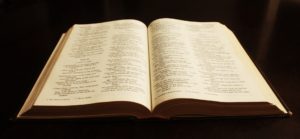 Biblical Discussion Questions
Biblical Discussion Questions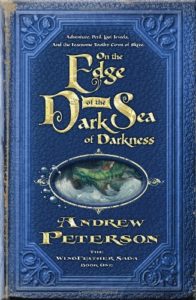 The Voyage of the Dawn Treader has a magnificent scene in which Eustace, in his dragon form, is being restored–painfully–at the hands of Aslan. How does this mirror the work of the Lord as he works on our own sinful, beastly selves?
The Voyage of the Dawn Treader has a magnificent scene in which Eustace, in his dragon form, is being restored–painfully–at the hands of Aslan. How does this mirror the work of the Lord as he works on our own sinful, beastly selves?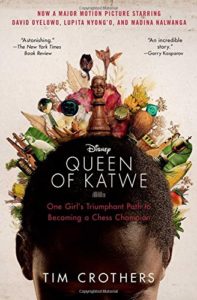 Every Falling Star
Every Falling Star